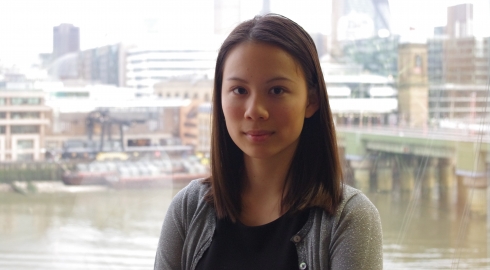Toronto-born journalist, Denise Law, has racked up an impressive array of passport stamps and career roles across three continents, winning journalism prizes and contributing to readership records along the way. And she’s only just
turned 27.
Now a Communities Analyst at the
Financial Times in London, where she works with commercial and editorial teams to build audience engagement across the world, Denise shares her top tips for forging out a
media career, her experience of going international, and being integral to the FT’s quest for more female readers.
I began work at the age of 14; starting young developed my confidence
I earned my first buck by dressing as a mascot. It might have been the worst job in the world but earning those $50 dollars felt really good and opened my mind to a world of possibilities. My next job as a fragrance spritzer was the
best lesson in how to deal with rejection. I realised that being told ‘no’ didn’t always mean the end of the road, and that stood me in good stead when I came to apply for competitive graduate jobs.
Networking has been of central importance at every stage of my career
While spritzing fragrance might not seem like a job that can open doors, some of those customers were important businesspeople. During our chats they’d ask me what I wanted to do. Those conversations led to business cards being
exchanged and invitations to industry and networking events.
You never know when an introduction will turn into an opportunity; as an undergraduate I was invited to New York to receive a Standard & Poor’s Award for Economic & Business Reporting; I handed out business cards and told people
I was interested in journalism in emerging markets (my dream was to become a foreign financial correspondent for Asia). A few months later, not long after I’d narrowly missed out on a place on the Financial Times graduate scheme, one of
those people called me up and the next thing I knew I was on a plane to Hong Kong where I became the Greater China Correspondent for a news start-up. Building good relationships has been very important throughout my career so far.
I always knew I wanted to work abroad and lay the foundations early
Growing up in Toronto with Asian parents made me realise how small a world we live in, and instilled the notion of an international career as something I wanted. While at university I did an overseas internship in London and spent a few
months studying in the Netherlands. They were great places to begin my global career because the culture shocks weren’t too intense. A significant percentage of Dutch people have postgraduate degrees and so the level of intellect and
skill made me push myself hard during my time there.
Those earlier experience didn’t, however, prepare me for the shock that would come when I landed my first graduate job in an emerging market where I couldn’t speak the language. Despite having stopped off in Shanghai to learn Mandarin,
the fact I looked Chinese but spoke English “like Angelina Jolie” certainly raised eyebrows in Hong Kong! It was quite intimidating at first, but I was lucky enough to find some
great mentors who supported me along the way.
I’ve always known what I’ve wanted out of a role before I’ve taken it
I’ve never had an exact
career plan for getting to where I wanted to be, but every time I’ve found an opportunity, I’ve taken time to examine whether it’s
going to give me what I need to take my career to the next level. Early on that was about working overseas and experiencing new cultures. When I moved into my current role as Communities Analyst in London, I wanted to get experience of
growing an audience, work with a group of people I could really trust, and be part of an innovative journalistic team – all things I knew I could get from this job.
I’ve only been in journalism for four years, but during that time the industry has changed more than it has over entire careers
That’s what the editors I work with at the Financial Times tell me. There’s been a huge change in how news organisations interact with their audiences; there are so many different distribution channels and the relationship between the
journalist and the reader is much more two-way. It’s fascinating to be at the intersection of all this digital change, and getting to know the FT audience as part of my role in the London office has been really insightful, particularly
with regards to what women want from us as a news organisation with a legacy of a majority-male readership.
Women love to read about other women in business, and they want to support one another wherever possible
When we first started talking about creating a
Women In Business section on the FT website, there were questions around whether we should be segregating women in this way.
But our research showed that women are really interested in reading about what other women are doing. We need those role models, who can show us what it takes to be a woman and succeed in all industries, and lead by example when it
comes to the topics that matter most – building
confidence,
growing networks, developing negotiation skills and
becoming leaders. The FT is now united in its
intent on growing its female readership and is itself committed to gender diversity – some of the most successful and impressive people at the FT are women, great role models whose work we celebrate.





